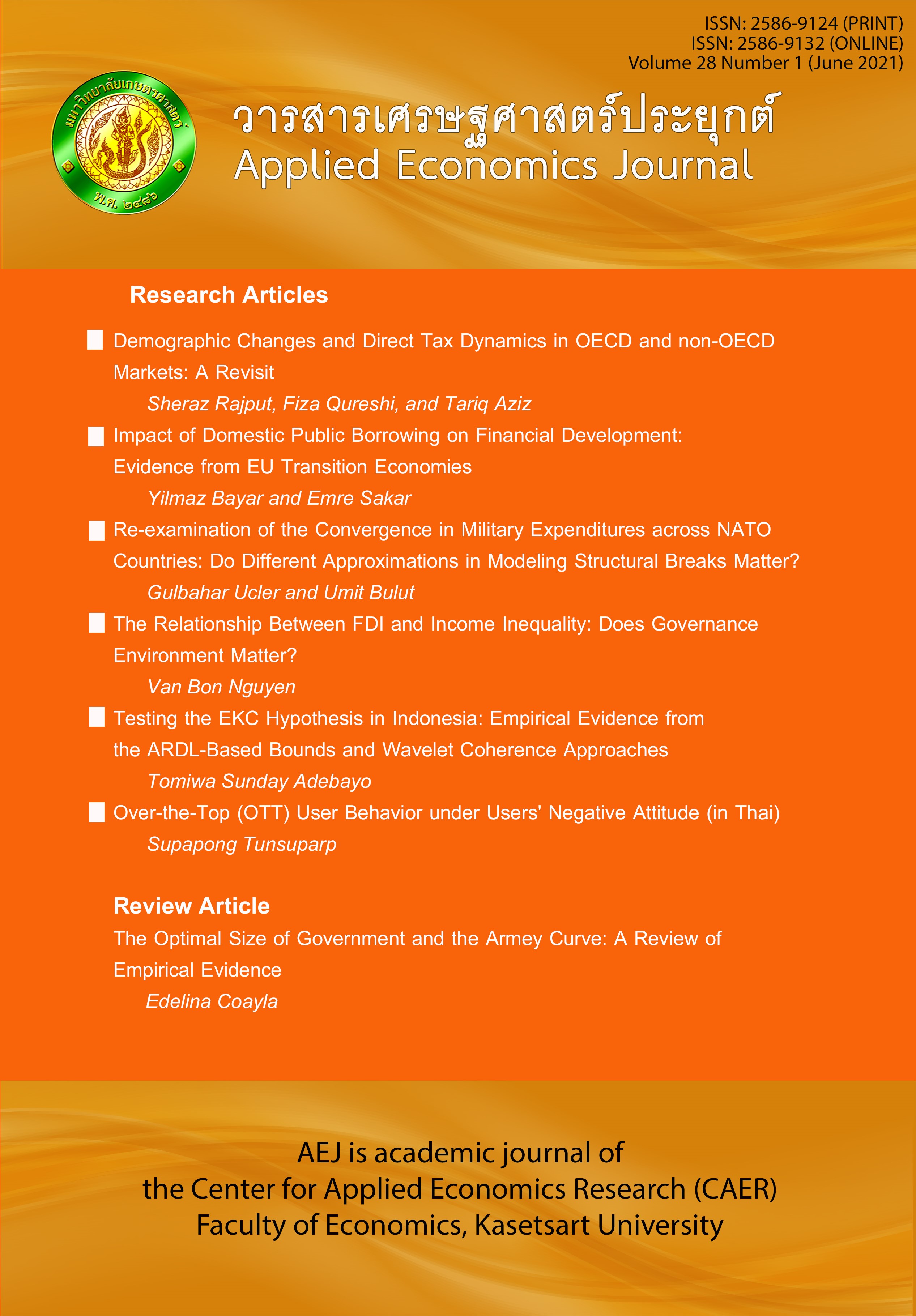Over-the-Top (OTT) User Behavior under Users' Negative Attitude
Main Article Content
Abstract
Over-the-top (OTT) services are growing dramatically in Thailand. From previous studies of usage behavior, users' characteristics and positive attitudes were used to study the impact on the use of OTT services. However, there are few studies that describe the effects of negative attitudes on usage behavior. This research therefore aims to study the effects of negative attitudes on OTT usage behavior by applying behavioral economics frameworks to explain irrational user behavior. The data used in this study are from the survey conducted by the Office of the National Broadcasting and Telecommunications Commission (NBTC). The results from multiple linear regression models show that only the attitude toward face-to-face interactions has a significant negative relationship with the amount of OTT use while a lack of sleep and concern about crime are the only two negative attitudes that significantly affect the expenditure on OTT services. These may reflect a behavioral bias regarding self-control problems or readjustment and habituation. Associated organizations can use the negative effects to improve OTT user behaviors.
Article Details
The paper is published under CC BY-NC-ND, in which the article is freely downloaded and shared in its original form non-commercially and its citation details are identified.
References
Adriaanse, M. A., Kroese, F. M., Gillebaart, M., & De Ridder, D. T. D. (2014). Effortless inhibition: Habit mediates the relation between self-control and unhealthy snack consumption. Frontiers in Psychology, 5(444), 1-6.
Bondad-Brown, B. A., Rice, R. E., & Pearce, K. E. (2012). Influences on TV viewing and online user-shared video use: Demographics, generations, contextual age, media use, motivations, and audience activity. Journal of Broadcasting & Electronic Media, 56(4), 471-493.
Cambridge Mobile Telematics. (2019). Connected Insurance Italy Market Survey 2019. Retrieved from https://www.cmtelematics.com/news/distracted-on-your-cell-phone-cambridge-mobile-telematics-tells-us/
Cartwright, E. (2018). Behavioral economics (3rd ed.). New York: Routledge.
Cho, H.-Y., Kim, D. J., & Park, J. W. (2017). Stress and adult smartphone addiction: Mediation by self-control, neuroticism, and extraversion. Stress Health, 33(5), 624-630.
Ericsson ConsumerLab. (2017). TV & Media 2017 A Consumer-Driven future of media. Retrieved from https://www.ericsson.com/assets/local/networked-society/consumerlab/reports/tv_media_2017_global_presentation.pdf
Gathergood, J. (2012). Self-control, financial literacy and consumer over-indebtedness. Journal of economic psychology, 33(3), 590-602.
Kim, S. J. (2016). A repertoire approach to cross-platform media use behavior. New Media and Society, 18(3), 353-372.
Kim, K. T., Lee, J. M., & Hong, E. O. (2013). Assessing the effect of self-control on retirement preparedness of US households. Consumer Interests Annual, 59, 1-6.
Kim, M. S., Kim, E., Hwang, S., Kim, J., & Kim, S. (2017). Willingness to pay for over-the-top services in China and Korea. Telecommunications Policy, 41(3), 197-207.
Lee, B., Fraser, I., & Fillis, I. (2017). Nudging art lovers to donate. Nonprofit and Voluntary Sector Quarterly, 46(4), 837-858.
Lee, C. C., Nagpal, P., Ruane, S. G., & Lim, H. S. (2018). Factors affecting online streaming subscriptions. Communications of the IIMA, 16(1), 1-25.
Lee, S.-E., Choi, M., & Kim, S. (2019). They pay for a reason! the determinants of fan’s instant sponsorship for content creators. Telematics and Informatics, 45, 101286.
Medina, M., Herrero, M., & Portilla, I. (2019). The evolution of the pay TV market and the profile of the subscribers. Revista Latina de Comunicación Social, 74, 1761-1780.
Netsanity. (2017). 5 surprising physical dangers of smartphone addiction. Retrieved from https://netsanity.net/smartphone-addiction/
Office of the NBCT. (2018). The analytical report in OTT industry and TV market in Thailand and future directions. Bangkok: Office of the National Broadcasting and Telecommunication Commission. (In Thai)
Office of the NBCT. (2019). OTT video subscription forecast, comparative study on OTT services in Thailand & global markets (2019-2023). (In Thai) Retrieved from https://broadcast.nbtc.go.th/data/academic/file/620800000002.pdf
Srinuan, C. (2015). Over-the-Top (OTT): Beginning of war in the new ICT ecosystem. Information Technology Journal, 11(1), 74-81. (In Thai)
Taneja, H., Webster, J., Malthouse, E., & Ksaizek. (2012). Media consumption across platforms: Identifying user-defined repertoires. New Media and Society, 14(6), 951-968.
Tangney, J. P., Baumeister, R. F., & Boone, A. L. (2004). High self-control predicts good adjustment, less pathology, better grades, and interpersonal success. Journal of Personality, 72(2), 271-324.
Thaler, R. H., & Shefrin, H. M. (1981). An economic theory of self-control. Journal of political Economy, 89(2), 392-406.
Wang, C. L., Zhang, Y., Ye, L. R., & Nguyen, D. (2005). Subscription to fee-based online services: What makes consumer pay for online content? Journal of Electronic Commerce Research, 6(4), 304.


